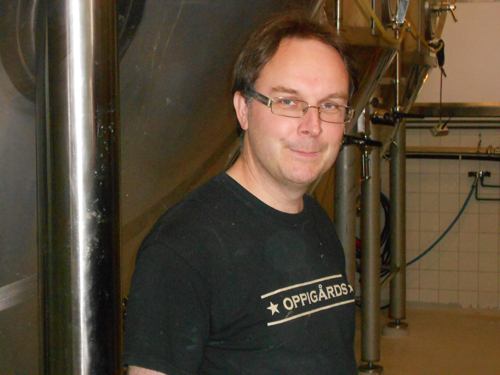Oppigards Brewery and the revival of farmhouse brewing
Who would have thought that the spectacular growth of a brewery start-up would be helped by – indeed – Sweden’s state-owned alcohol monopoly retailer Systembolaget? Doesn’t this run counter to our long-cherished prejudice that the bureaucrats at a monopoly retailer would only like to deal with one albeit big client? Think scale, efficiencies, logistics – the whole "big is best" beer caboodle.
Sometimes reality does not live up to our preconceived notions. And Sweden’s alcohol system is a case in point. Although Sweden has been a member of the European Union since 1995 where any barriers to free trade are usually frowned upon, the EU for complex political reasons allowed Sweden to keep its state-owned alcohol monopoly. So today if Swedes want to buy a full-strength beer rather than the 3.5 % abv variety which is sold in supermarkets, they need to visit one of the 417 nationwide outlets run by Systembolaget, where 80 percent of total beer (4.8 million hl in 2009) is sold. It’s therefore no coincidence that brewers’ market shares have been unchanged for many years. Carlsberg is the leading player with about 30 percent of Systembolaget’s beer sales, followed by the privately-owned Spendrups brewery with 19 percent.
Still, when Björn Falkeström, 44, with a start-up capital of EUR 100,000 put together his business plan for a craft beer brewery sometime in the 1990s, he knew that he had to get into Systembolaget to achieve some sort of size ... and get paid on time.
In 2011 his Oppigards brewery will sell about 6,000 hl of beer, up from 8,000 litres in 2004, the year he started brewing, which already makes him one of the largest craft brewers (30 in total) in the country.
When people think of Sweden, the picture of a countryside dotted with little red wooden houses near a lake usually comes to mind. It’s in such a stereotypical Swedish idyll that Mr Falkeström, a computer scientist and MBA by training, set his brewery. The Oppigards brewery, a cluster of old and newly built dark-red coloured houses surrounded by paddocks and forests, is located on the 250-year-old Falkeström family farm in a village of perhaps 100 inhabitants, 8 km away from the nearest town of Hedemora (7,000 inhabitants) in central Sweden – which is about 150 km north of Stockholm.
Mr Falkeström mostly brews ales – his major brand is the award-winning Golden Ale launched in 2006 – which he says are not just cheaper to produce than lagers, but which also help him avoid competing against the big guys.
Obviously, his product choice has made him an imminently attractive supplier for Systembolaget. To defend its monopoly, Systembolaget has to provide an interesting portfolio of beers. Consumer satisfaction is central to Systembolaget’s reason for being which means that the retailer continuously has to develop its alcohol portfolio. Approximately 15 percent to 20 percent of its portfolio is being renewed each year, so new listings are extremely important to Systembolaget. That in turn makes it relatively easy for newcomers with limited funds to enter the market. Once you are in Systembolaget, you are more or less set and done. Promotions and campaigns, which usually cost brewers an arm and a leg, are not allowed in its shops. Craft brewers just have to make sure their quality is up to specs.
Although Mr Falkeström has to enlist a logistics company to take his products 1,500 km up and down the country and directly to each of Systembolaget’s outlets, this makes his a profitable and simple-to-run business. With a turnover of SEK 19 million (EUR 2 million/USD 2.9 million) and no debt, Oppigards is probably the most profitable small brewer in Sweden as 90 percent of its sales are conducted via Systembolaget, which pays him SEK 11.50 (EUR 1.2/USD 1.8) for each 0.33 litre bottle of his Golden Ale delivered to the shops. Mr Falkeström laughingly admitted that he only has to write four (!) invoices a month: three to Systembolaget and one to a distributor who looks after his sales to the on-trade.
Occasionally, Mr Falkeström, who runs his brewery together with his wife and five employees, worries over his dependency on Systembolaget. But as he says, expanding into the on-trade sector isn’t really an alternative as he does not have a sales force. Moreover, doing business with the on-trade is far from lucrative in Sweden.
The more pressing of his worries is how to meet the rising demand for his beers in the future. Currently, the craft beer segment is 1 to 2 percent of total consumption in a market which is dominated by lager (97 percent and 3 percent ales). However, it is rising steadily.
Ideally, Mr Falkeström would like to sell about 7,000 hl beer per year. That’s the limit of his current license, which takes into account his own available water volumes. Should he want to grow beyond that volume not only would he have to use municipal water from Hedemora, he would also have to build and run a larger sewage plant in the village – two things he does not really fancy doing.
For the time being he has to push these issues to the back of his mind. He is busy building a new brewhouse and a large warehouse. Only when these tasks are finished in the next few weeks will he find time to devote himself to his long-term options. Methodically and thoroughly. Just the way he has done everything so far.


